

Written by Yan Qiaohong / Translated by Wen Xiaqing
As the night closes in, Nanning is ablaze with light, and its reflection sways as if it were a graceful beauty at the ripples of Nanhu Lake. E-scouters file past in an endless stream, carrying people home at twilight, a scenery unique to the city. Streets are lit by lines of neon lights, and so does the nightlife of Nanning locals. They gather in twos and threes with friends, some seeking delicious food at the Zhongshan Road, some walking or jogging at the Qingxiu Mountain, while others turning to bookstores, immersing themselves in a rustle of paper as they turn the pages...
Every soul will find his tailored nighttime surprise and delight in the city.
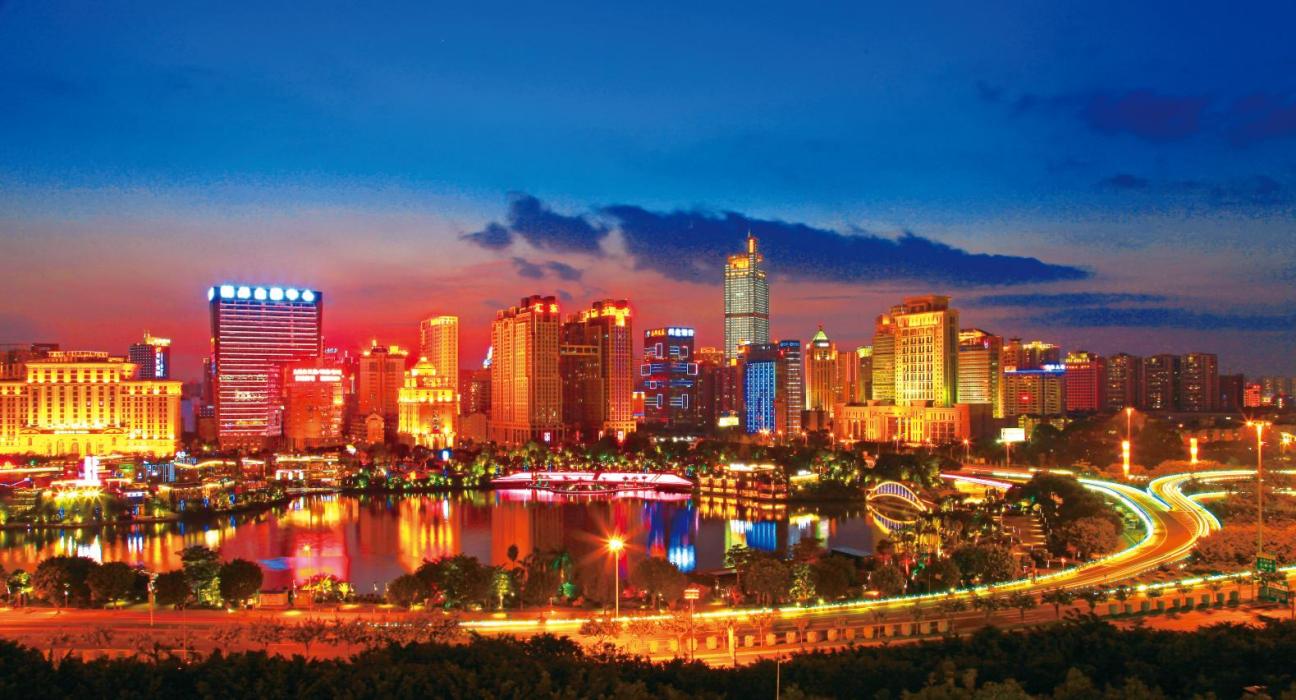
A night tour of mountains and waters
Living in a city where lush green trees blend with modern buildings and the Yongjiang River meanders at the foot of the vibrant Qingxiu Mountain, the warm-hearted Nanning locals, then, always seem to have an enduring love for the beautiful mountains and waters.
The story begins with the Yongjiang River.
In 1965, the villagers of the Song Village, who lived by the river, took a ferry downstream in the Yu River, traveling 30 kilometers to the newly-built Minsheng Wharf to trade rice wine and farm produce. They might as well travel over 60 kilometers from west to east, bartering for cane sugar and fish along the Bachi River, a tributary of the Yongjiang River.
Yongjiang, a waterway bustling with ships, is revered as the mother river of Nanning locals. Though daytime Minsheng Wharf today no longer buzzes with boats, it still harbors the locals who search for a good view at night.
Jinsui, a cruise ship whose name means the golden ears of crops, nosed its way off the Wharf in a whistling sound, freeze-framing riverside lights. Time and moonlight seem intertwined in the south of the Yu River. Tourists set aside fatigue in the cool breeze as night gathers.
A night tour of the Yongjiang will first bring you to the Changyou Pavilion. The pagoda-like building is illuminated in the darkness, and though it's an imitation of ancient architecture, it overlooks the ground no less magnificently and offers a broad view of the far when you climb to the top. The Pavilion, as well as the tablet inscribed with the Chinese character "yong" and the 100-meter ancient ramparts at its root, opens the first chapter of the tour. The cruise ship shuttles between different parts north of the river as if it were traveling back in time. The smell of concrete buildings and cooking at Chaoyang Square blends in the air. When standing at the bows with gaze wandering, a tourist may allow his thoughts to drift into the past and present of Nanning.
A 60-minute cruise trip — starting from neon lights lit Yongjiang Bridge and turning back at the Huluding Bridge — seems like reading the living history of Nanning's bridges. During the tour, the tourist will first pass by Taoyuan Bridge, and enjoy symbolic geometric patterns from the Zhuang embroidery projected on its pillars. And after another 500 meters, he'll reach the Lingtie Bridge, whose body curves like a bow, shooting beams of light like arrows to form a light curtain. Both shores of the river are bathed in soft lighting, even the reflection of the Guangxi Culture & Art Center in lucid water.
The center appears as a mountain sitting on a river bank. Three concert halls — the center's main body — are contoured with fluid white lines, reminiscent of Guangxi's distinctive karst landform. Even the river is scented with the fragrance of poetry and drama when it flows by. All these give the tourist an illusion of sailing on the Lijiang River when he passes.
As shallop sails on greenish water, tourists are as if roaming in a picture.
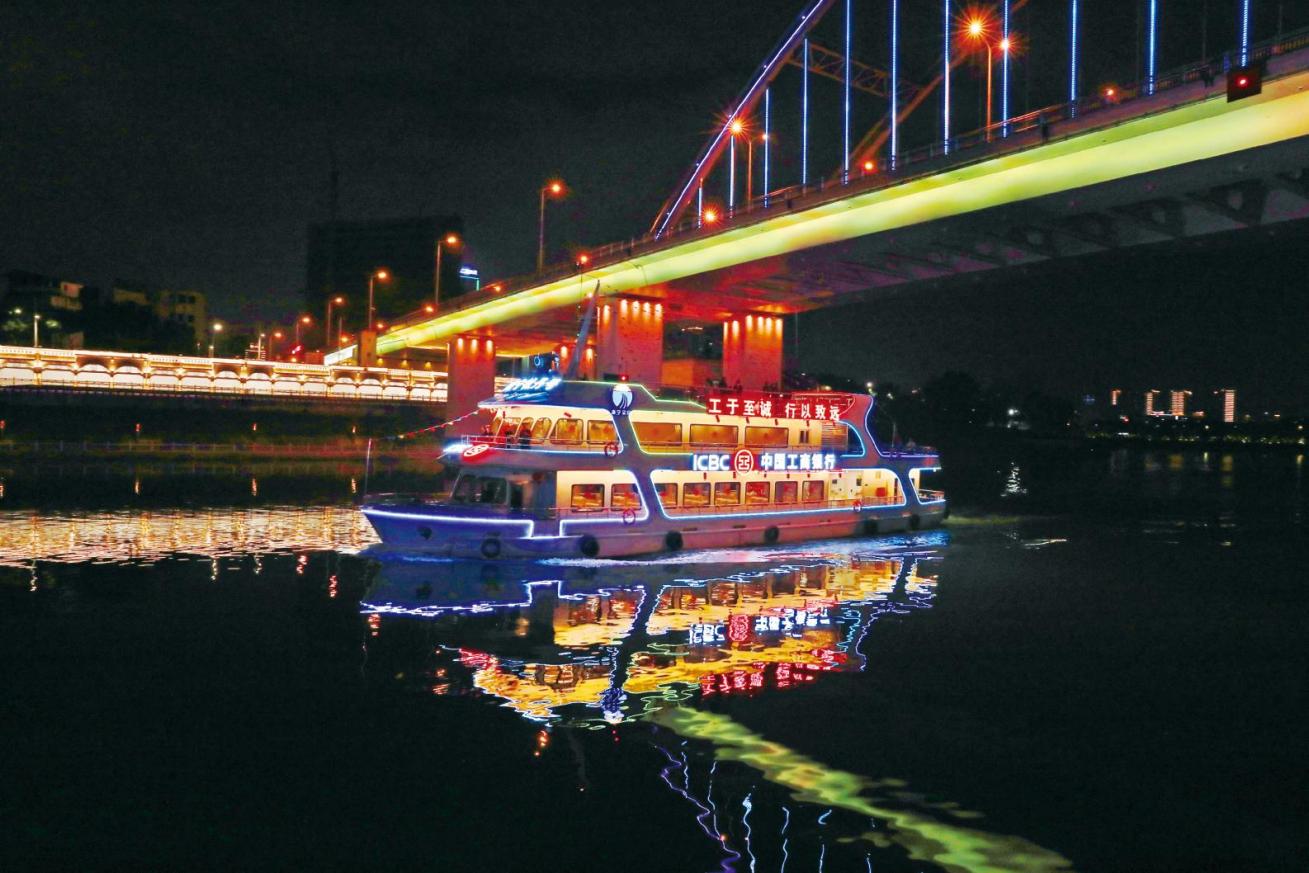
When Jinsui turns back, the deck lights come up one after another, and in melodious folk songs played on guitar, the scent of tea made from traditional techniques of the Zhuang people quietly creeps in. The Huluding Bridge stands in fading light, seeing yet another batch of tourists off.
On the bridge tails off the traffic rush as the night grows late; under the bridge wanders the ship, looking for the next scenery.
A night tour begins at a green garden path in Qingxiu Mountain, a little more than 5 kilometers away from the wharf.
One can take the mountain's east entrance at the Tongguling Road and enjoy the 6-kilometer exhibition gallery of lush vegetation parks, which dot the axis of the mountain. When strolling along the bamboo garden in the light breeze, the tourist will often see fitness fanatics jogging through the garden's greenway. Those elderly conducting Tai Chi exercises and Baduanjin (an exercise invented by ancient Chinese, comprising eight movements) look hale and hearty set off by the moonlight.
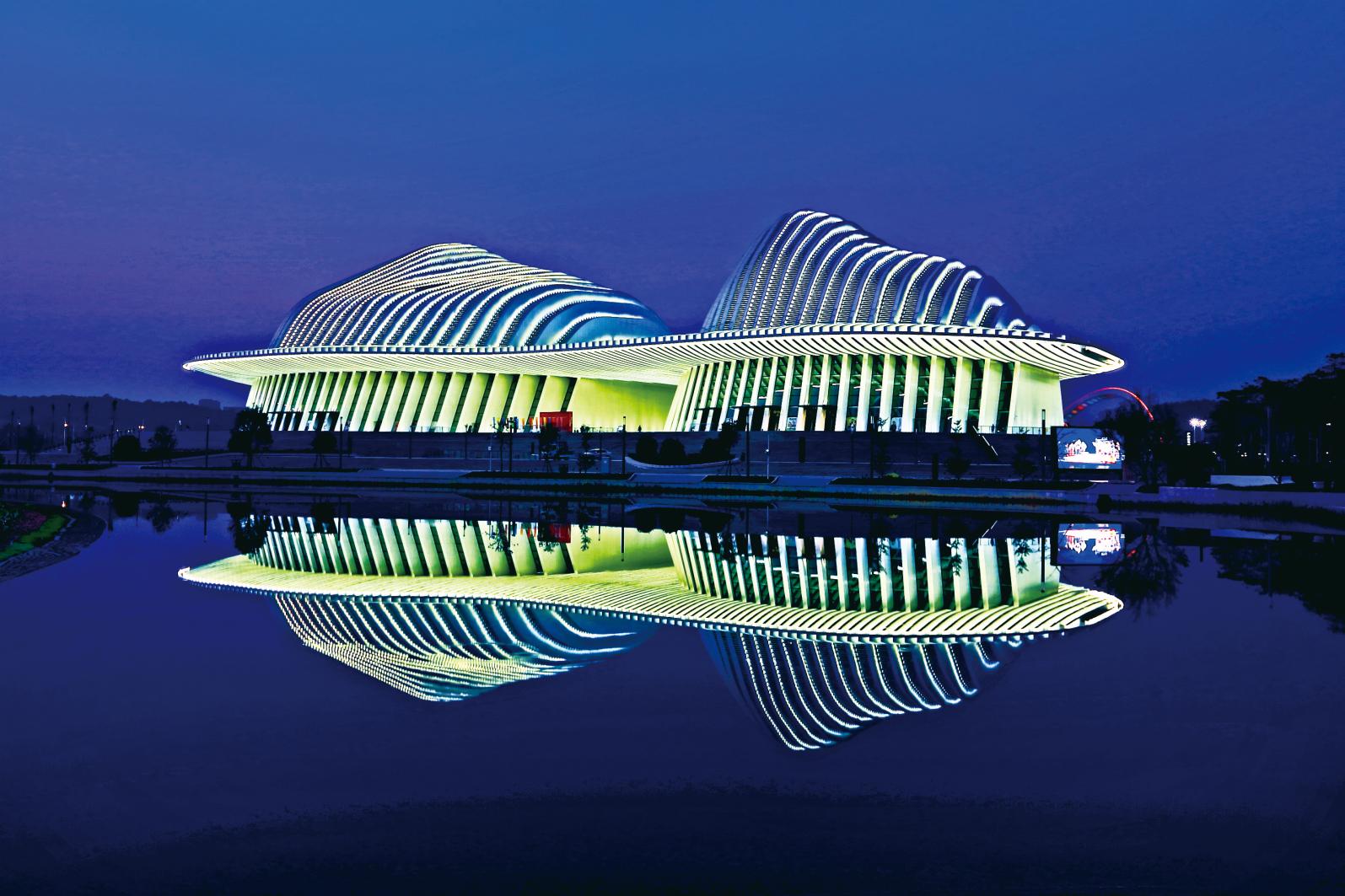
Besides the garden, the scenic spot covering some 200 hectares in east Qingxiu Mountain for a night tour incorporates several parts, including Bougainvillea Spectabilis Garden, Sakura Garden, and Youth Science and Research Camp. If one happens to meet the light show irregularly available to the public, he will feast his eyes on the spectacular sea of lanterns hung all over the spot. And with each step he takes, he enjoys diverse views.
Several hundred years ago, Xu Xiake, a renowned geographer and traveler of the Ming Dynasty, wrote a panegyric on Nanning's mountains, saying "[I felt compelled to] make a complimentary remark in order not to squander the wonderful time." It is not hype, and today, people take their night tours to the Mountain, which deserves to be called "wasting no good time."
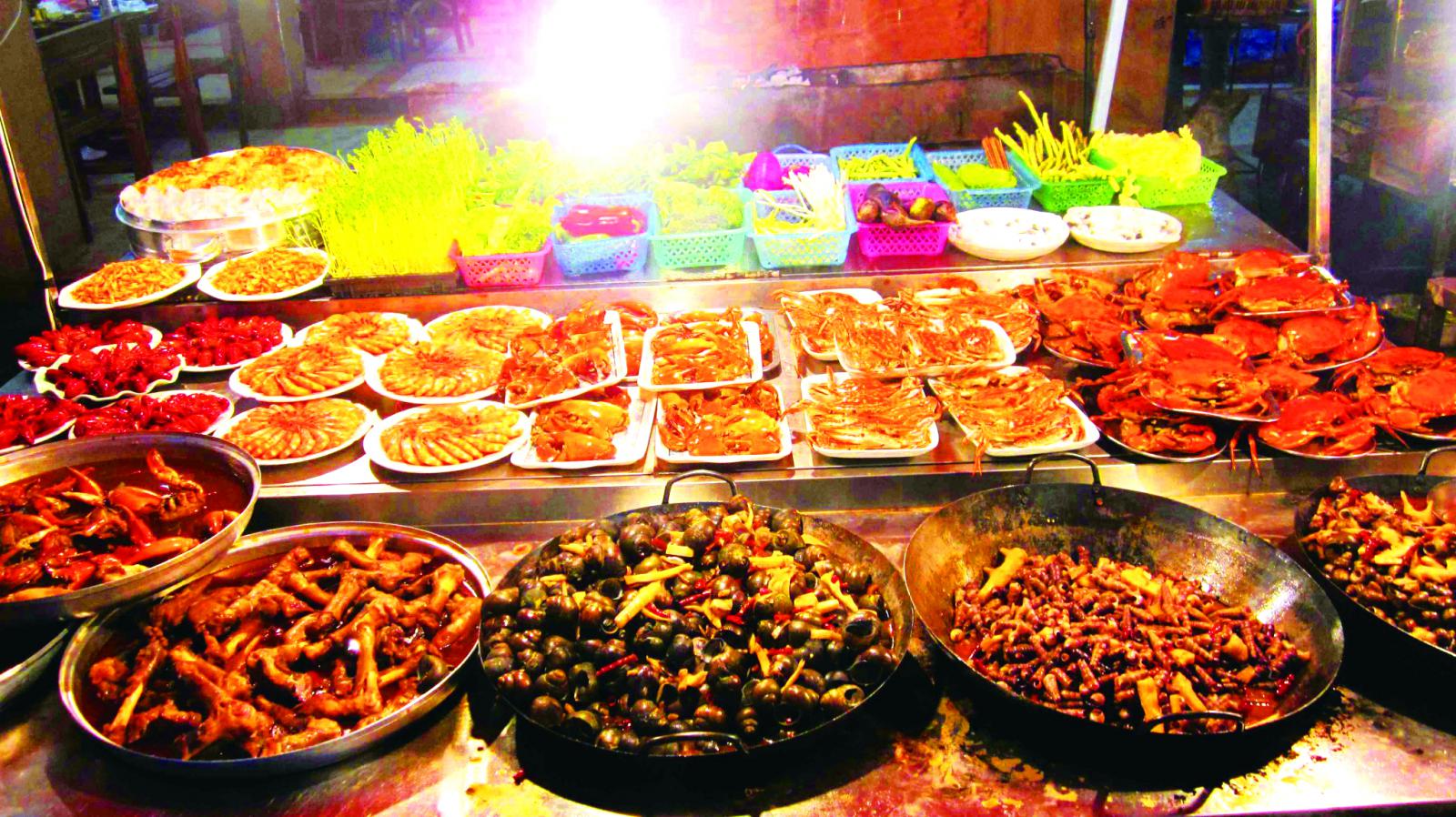
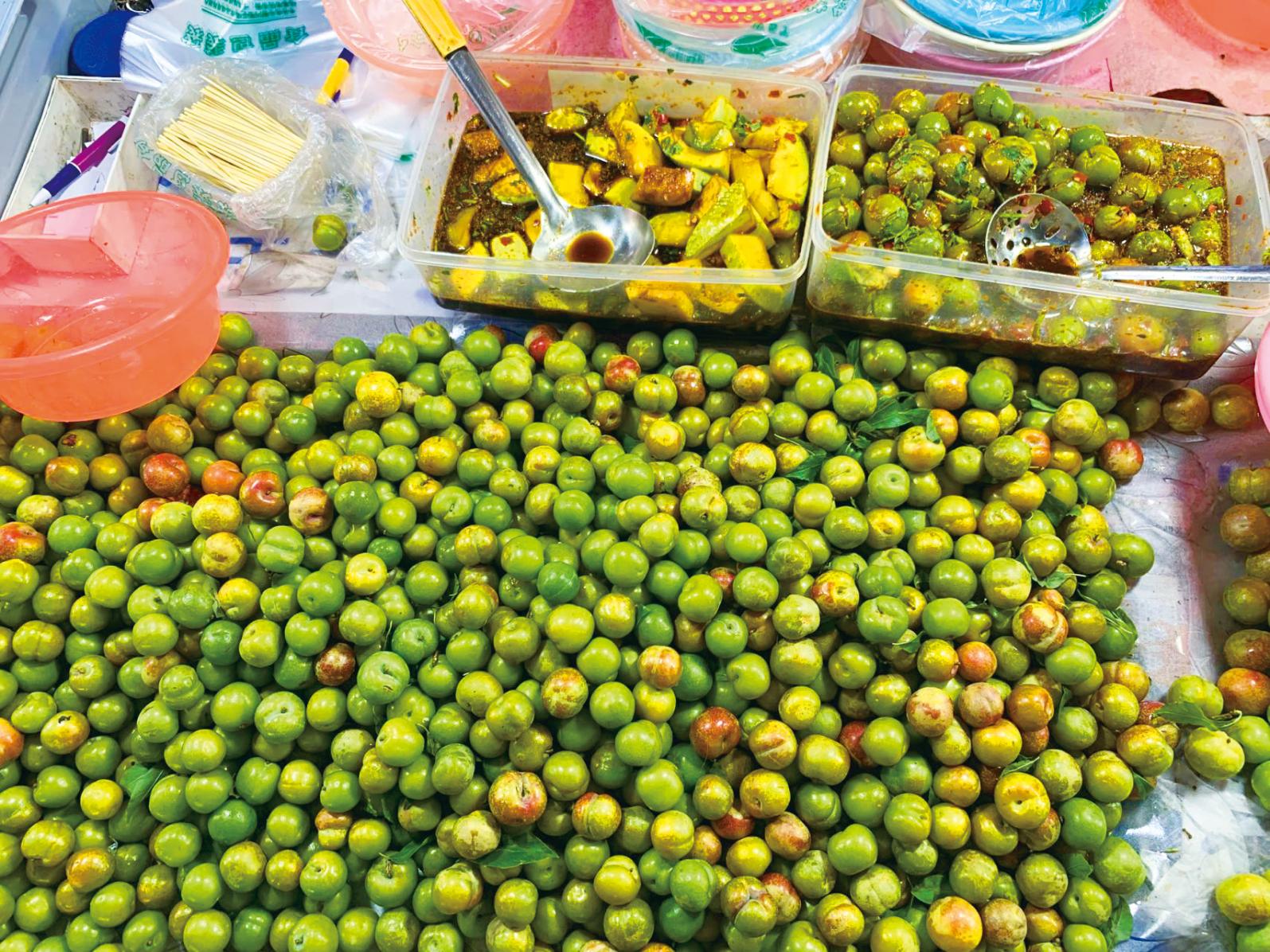
Long night with a big stomach
Of countless spacious buildings in the world, a good night's rest requires only a compact one; however affluent one might be, the meals that he takes for a day are just three as others despite his wealth.
Above is a close-up of the traditional mindset of eating and living in the hit documentary A Bite of China, yet it is unaware that the meals that the Nanning locals actually have four meals a day, not three. Thanks to its ample summertime and short winter, Nanning can run night markets in four seasons. Just call friends up to a hang-out night market, where square wooden tables, benches, or plastic chairs are usually set up temporally by the streets. BBQ, beers, Nanning-special Laoyou rice noodles (which refers to old friend rice noodles in Chinese), stir-fried river snails or sea ones, and finger-guessing game — a drinking game at feasts. Be it lonely souls or grumbling stomachs, all will be consoled by roadside food stalls and streets hiding in corners of the city.
In 2019, Nanning topped the Best City for Midnight Snack by Alibaba's Digital Media and Entertainment Group. And as China's top 10 food streets, the Zhongshan Road serves as the locals' midnight dinner. As a "daytime cottage and nighttime paradise," the old street is like Jianghu, a fictional community where people from certain areas gather, as it's filled with the smell of cooking for families, the portrait of ordinary people's everyday life, the gossips of families and neighbors, and the feelings of the fickleness of human nature.
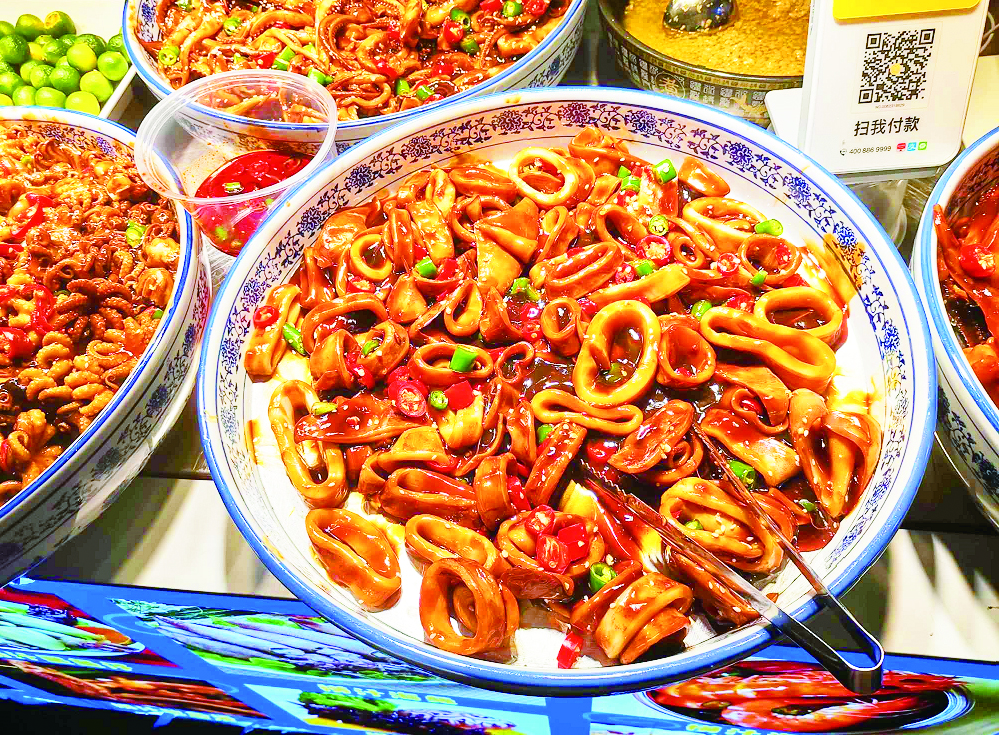
It's 1 a.m., and looking from the city's vibrant streets, late-night strollers are gradually leaving this little more than 10-meter-wide street. Outdoors, balloon and cell phone accessory vendors are still holding their ground, and so does motorcycle taxi drivers, who are confident in picking up a few more passengers.
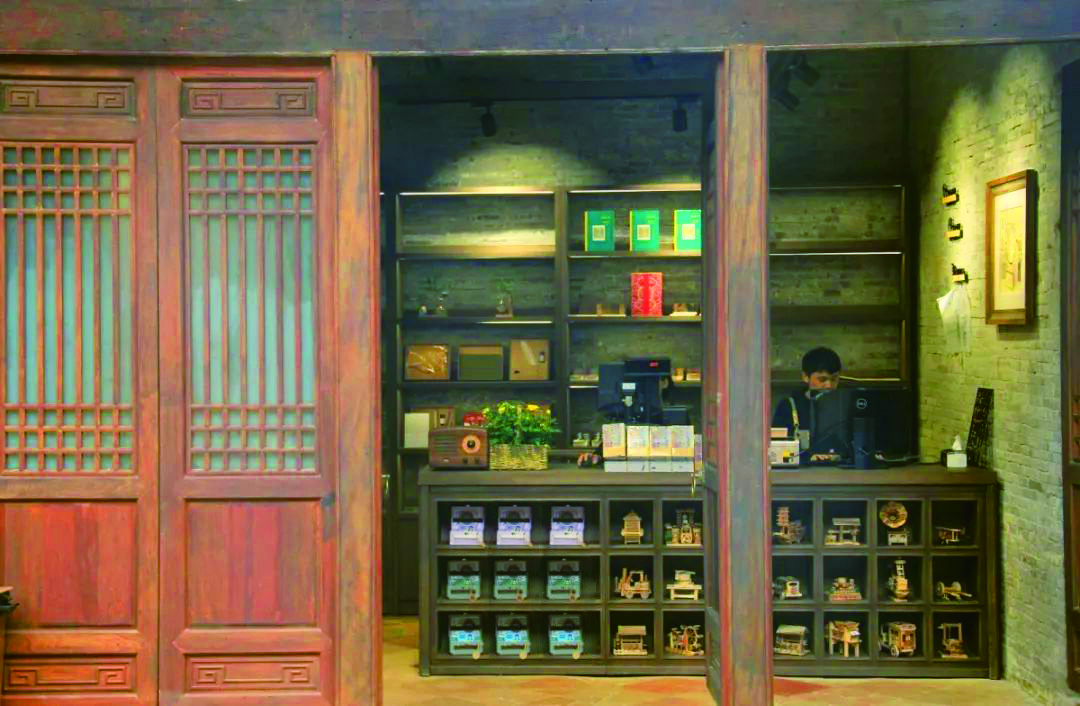
1 a.m. is such a magical time — it's the exact hour when someone just finishes his movie in a cinema, gets out of KTV, throat sore from singing, or suffers from insomnia while others wake up from a nightmare. These young people wistful about the night meet at food stalls, putting their drowsiness to cool beers and sizzling BBQ meat. And if all these can't wake up their appetite, they may resort to Suanye — a variety of pickled fruits and vegetables.
Suanye, or literal "something sour" in the Nanning dialect, benefits from abundant fruit resources as its ingredients, and the name exude the preference of Nanning locals for it. Pickled fruits and vegetables well preserve the fresh and sweet taste of the ingredients while commingled with sour and spicy flavors exclusive to pickles. Just in one bite you'll get hooked on them and can't get enough. Deceptively simple, making suanye includes a combination of complex processes, including concocting sour juice, slicing fruits and vegetables, steeping the ingredients in juice until flavors fully blend, spraying on seasoning, and at last, putting in some peppers or even soy sauce. Often it takes one or two days to become tasty.
Baoji Suanye, famous for its mixed sweet, sour, and hot taste, focuses on the flavor of Jianghu, which derives from not just the physical sensation, but the life experience as a street vendor who makes a living from the roadside food stall.
Reading at night — the last sense of occasion when night falls
"No Man Is an Island; Every Book Is a World." — The Storied Life of A.J.Fikry by Gabrielle Zevin, an American writer.
The sentence taken from Zevin's novel hangs at the corner of the Lijiang Bookstore in the Jinshi Lane, Xingning Road, Nanning. The store is quiet, with only a rustle of books and the slight sound of putting a coffee cup down on the table. Even the tourists who are attracted by the cultural and creative ambiance of the store can't help stopping by the shelves labeled "Select."
Nanning locals' night tour can last long in books.
It's 21:45, 15 minutes before the store closes. Ms. Wei still sits at the corner of the store, the only occupant of that narrow corridor. Grey bricks and wooden shelves collaborate to create a cozy little room sheltering the lone reader. "I live in Langdong, southeast of the city, and I often come here reading by e-scooter," said Wei with a book in her hands. It was Reading Guangxi, an overview of Guangxi's culture and environment, and the second book that she flipped through tonight.
nlike other internet-famous bookstores, Lijiang Bookstore does not set up a specific lounge, and like Wei, many readers sit around the shelves, immersing in the realm of books, just like modern Chinese poet and scholar Wen Yiduo, who was so hooked on books that he was reluctant to leave his room and come downstairs.
Besides, there is no air conditioning in the store.
Lijiang bookstore is renovated from a Lingnan-style residential building, a quadrangle courtyard with three yards. In the yard, there is a disused well with fish in it; someone is taking photos with a rusty rickshaw that parks in the yard; a cat is moving cautiously in catching some bugs, quiet as the ceiling fan. Owing to the reasonable layout of lights in the store, ceiling fans won't cast any dappled shadows of lights.
"I will take a walk at the Sanjie Liangxiang historical cultural block and eat a bowl of Laoyou rice noodles," said Wei, closing her book and preparing for ending her night reading. Though on the verge of closing time, tourists still come in flocks to visit the store or take photos. As Lijiang Bookstore locates in the Sanjie Liangxiang historical cultural block near Chaoyang Square, it receives a steady stream of visitors, who, attracted by the distinctive yard full of the aroma of books, gain the final sense of occasion in night reading.
桂ICP备14000177号 Copyright@2006-2013 Guangxi China-ASEAN Panorama Magazine Agency Co., Ltd. All Rights Reserved